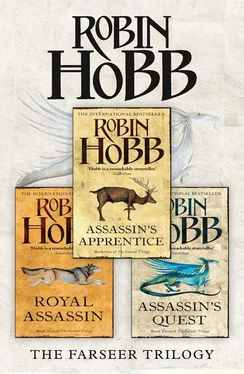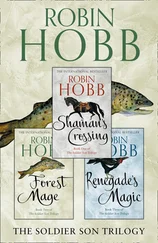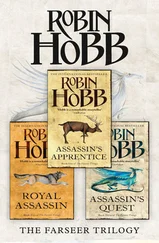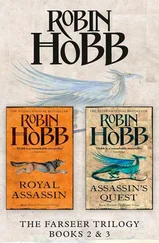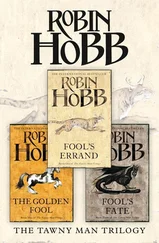‘You are wearied,’ my boy says. He is standing at my elbow and I do not know how long he has been there. He reaches forward slowly, to lift the pen from my lax grip. Wearily I regard the faltering tail of ink it has tracked down my page. I have seen that shape before, I think, but it was not ink then. A trickle of drying blood on the deck of a Red Ship, and mine the hand that spilled it? Or was it a tendril of smoke rising black against a blue sky as I rode too late to warn a village of a Red Ship Raid? Or poison swirling and unfurling yellowly in a simple glass of water, poison I had handed someone, smiling all the while? The artless curl of a strand of woman’s hair left upon my pillow? Or the trail a man’s heels left in the sand as we dragged the bodies from the smouldering tower at Sealbay? The track of a tear down a mother’s cheek as she clutched her Forged infant to her despite his angry cries? Like Red Ships, the memories come without warning, without mercy. ‘You should rest,’ the boy says again, and I realize I am sitting, staring at a line of ink on a page. It makes no sense. Here is another sheet spoiled, another effort to set aside.
‘Put them away,’ I tell him, and do not object as he gathers all the sheets and stacks them haphazardly together. Herbery and history, maps and musings, all a hodge-podge in his hands as they are in my mind. I can no longer recall what it was I set out to do. The pain is back, and it would be so easy to quiet it. But that way lies madness, as has been proven so many times before me. So instead I send the boy to find two leaves of Carryme, and ginger root and peppermint to make a tea for me. I wonder if one day I will ask him to fetch three leaves of that Chyurdan herb .
Somewhere, a friend says softly, ‘No.’
Royal Assassin
Book Two of the Farseer Trilogy
ROBIN HOBB
For Giles
and for Raphael and Freddy,
the Princes of Assassins
Cover
Title Page
Dedication
Prologue
One: Siltbay
Two: The Homecoming
Three: Renewing Ties
Four: Dilemmas
Five: Gambit
Six: Forged Ones
Seven: Encounters
Eight: The Queen Awakes
Nine: Guards and Bonds
Ten: Fool’s Errand
Eleven: Lone Wolves
Twelve: Tasks
Thirteen: Hunting
Fourteen: Winterfest
Fifteen: Secrets
Sixteen: Verity’s Ships
Seventeen: Interludes
Eighteen: Elderlings
Nineteen: Messages
Twenty: Mishaps
Twenty-One: Dark Days
Twenty-Two: Burrich
Twenty-Three: Threats
Twenty-Four: Neatbay
Twenty-Five: Buckkeep
Twenty-Six: Skilling
Twenty-Seven: Conspiracy
Twenty-Eight: Treasons and Traitors
Twenty-Nine: Escapes and Captures
Thirty: Dungeons
Thirty-One: Torture
Thirty-Two: Execution
Thirty-Three: Wolf Days
Epilogue
PROLOGUE
Dreams and Awakenings
Why is it forbidden to write down specific knowledge of the magics? Perhaps because we all fear that such knowledge would fall into the hands of one not worthy to use it. Certainly there has always been a system of apprenticeship to ensure that the understanding of magic is passed only to those trained and judged worthy of such knowledge. While this seems a laudable attempt to protect us from unworthy practitioners of arcane lore, it ignores the fact that the magics are not derived from this specific knowledge. The predilection for a certain type of magic is either inborn or lacking. For instance, the ability for the magics known as the Skill is tied closely to blood relationship to the royal Farseer line, though it may also occur as a ‘wild strain’ amongst folk whose ancestors came from both the Inland tribes and the Outislanders. One trained in the Skill is able to reach out to another’s mind, no matter how distant, and know what he is thinking. Those who are strongly Skilled can influence that thinking, or have converse with that person. For the conducting of a battle, or the gathering of information, it is a most useful tool .
Folklore tells of an even older magic, much despised now, known as the Wit. Few will admit a talent for this magic, hence it is always said to be the province of the folk in the next valley, or the ones who live on the other side of the far ridge. I suspect it was once the natural magic of those who lived on the land as hunters rather than as settled folk; a magic for those who felt kinship with the wild beasts of the woods. The Wit, it is said, gave one the ability to speak the tongues of the beasts. It was also warned that those who practised the Wit too long or too well became whatever beast they had bonded to. But this may be only legend .
There are the Hedge magics, though I have never been able to determine the source of this name, which are both verified and suspect, including palm reading, water gazing, the interpretation of crystal reflections, and a host of other skills that attempt to predict the future. In a separate unnamed category are the magics that cause physical effects, such as invisibility, levitation, giving motion or life to inanimate objects – all the magics of the old legends, from the Flying Chair of the Widow’s Son to the North Wind’s bewitched tablecloth. I know of no people who claim these magics as their own. They seem to be solely the stuff of legend, ascribed to folk living in ancient times or distant places, or beings of mythical or near mythical reputation: dragons, giants, the Elderlings, the Others, pecksies .
I pause to clean my pen. My writing wanders from spidery to blobbish on this poor paper. But I will not use good parchment for these words; not yet. I am not sure they should be written. I ask myself, why put this to paper at all? Will not this knowledge be passed down by word of mouth to those who are worthy? Perhaps. But perhaps not. What we take for granted now, the knowing of these things, may be a wonder and a mystery someday to our descendants.
There is very little in any of the libraries on magic. I work laboriously, tracing a thread of knowledge through a patchwork quilt of information. I find scattered references, passing allusions, but that is all. I have gathered it, over these last few years, and stored it in my head, always intending to commit my knowledge to paper. I will put down what I know from my own experience, as well as what I have ferreted out. Perhaps to provide answers for some other poor fool, in times to come, who might find himself as battered by the warring of the magics within him as I have been.
But when I sit down to the task, I hesitate. Who am I to set my will against the wisdom of those who have gone before me? Shall I set down in plain lettering the methods by which a Wit-gifted one can expand his range, or can bond a creature to himself? Shall I detail the training one must undergo before being recognized as a Skilled one? The hedge wizardries and legendary magics have never been mine. Have I any right to dig out their secrets and pin them to paper like so many butterflies or leaves collected for study?
I try to consider what one might do with such knowledge, unjustly gained. It leads me to consider what this knowledge has gained for me. Power, wealth, the love of a woman? I mock myself. Neither the Skill nor the Wit has ever offered any such to me. Or if they did, I had not the sense nor ambition to seize them when offered.
Power. I do not think I ever wanted it for its own sake. I thirsted for it, sometimes, when I was ground down, or when those close to me suffered beneath ones who abused their powers. Wealth. I never really considered it. From the moment that I, his bastard grandson, pledged myself to King Shrewd, he always saw to it that all my needs were fulfilled. I had plenty to eat, more education than I sometimes cared for, clothes both simple and annoyingly fashionable, and often enough a coin or two of my own to spend. Growing up in Buckkeep, that was wealth enough and more than most boys in Buckkeep Town could claim. Love? Well. My horse Sooty was fond of me, in her own placid way. I had the true-hearted loyalty of a hound named Nosy, and that took him to his grave. I was given the fiercest of loves by a terrier pup, and it was likewise the death of him. I wince to think of the price willingly paid for loving me.
Читать дальше
